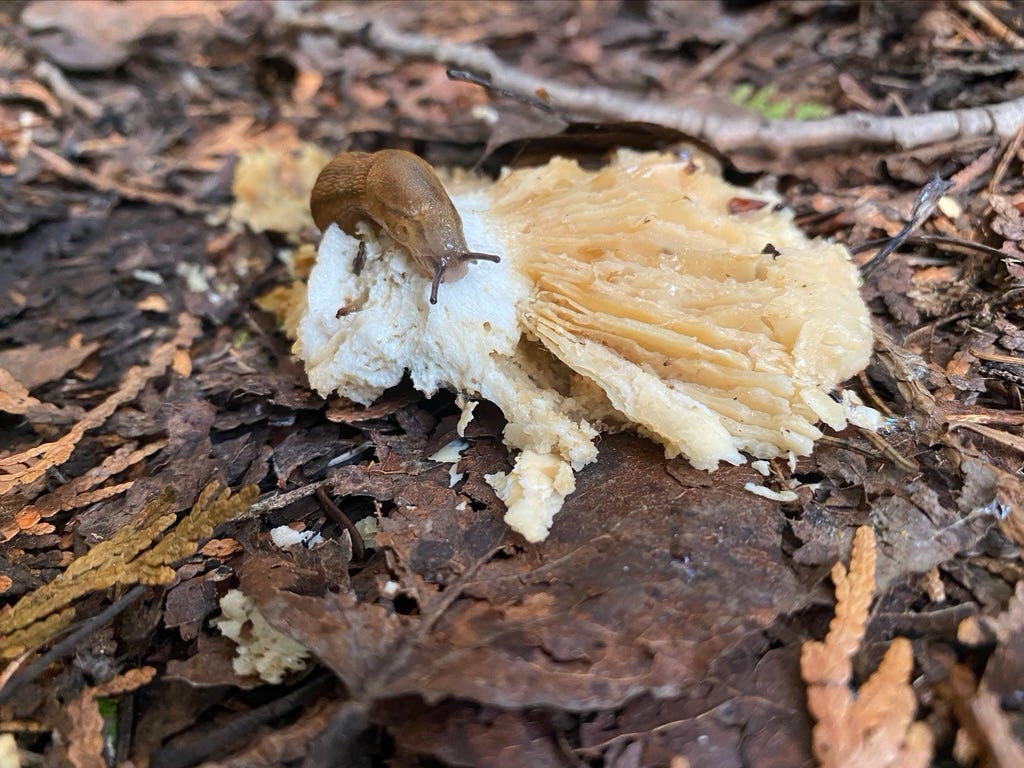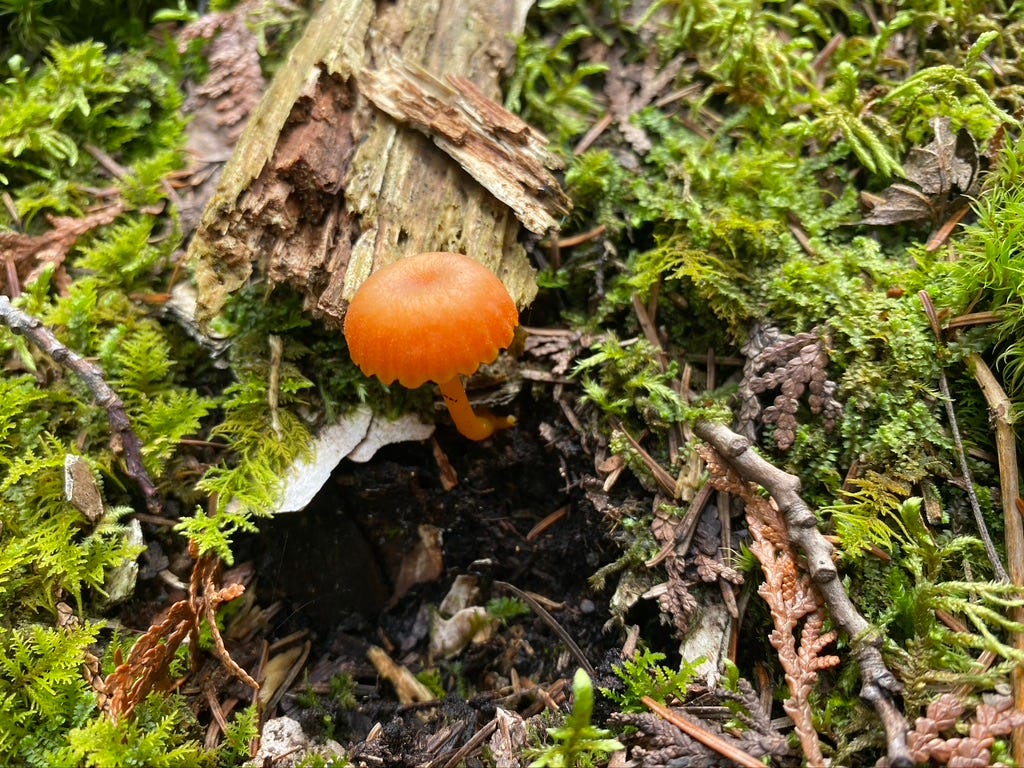When You Have Explained Things You Only Have An Explanation
So many questions. Not enough vultures.
During the recent torrential downpours that accompanied Hurricane Beryl I found myself wondering about moths. Where do moths go when it rains? Doesn’t it kill them when you touch them and steal the dust from their wings? How is every rainstorm not a cataclysm, in the moth world? Do they cling to the undersides of leaves? Nestle deep into the furrows of maple bark? Are they hydrophobic? I’m sure I could find out but I’ve never thought to. There is so much left that I don’t know and that I haven’t even thought to ask.1
As much as I like living at a time when I can have just about any factual question answered by reaching into my pocket, there’s something to be said for not knowing, too. I went backpacking last weekend on Ontario’s Bruce Peninsula with my wife and some friends, and I got a rare chance to impress them by rehydrating a set of fancy home-cooked taco fillings, which I’d dehydrated in the days leading up to our trip. This led my my friend Huck to wonder aloud whether anyone had ever thought to try dehydrating a cocktail so that booze could be brought to the backcountry without the weight of actual alcohol. A just-add-water old fashioned for the campfire sounded pretty nice to all of us. But this question—asked outside of cell phone range—led to a dayslong debate about all the various components of this idea that would or would not be plausible, based on little more than our collective memories and interpretations of various high school and college chemistry concepts. Things got contentious. But it also felt worthwhile to choose to confront such a question at a time when we had no other way to answer it than to try to use whatever reasoning skills we could claim.2
Every new question I have, every new observation about the natural world, makes me feel increasingly disconnected from the social order of things. The systems under which we live and labor are actively hostile to life on earth. Our own and all others. It is beyond vanity to think that we can and should tamper with every system on the planet and think there will be no consequences to suffer. It’s almost trite at this point, and repeating it is not enough to change it, but here we are. (“When you have explained things,” Jim Harrison once wrote, “you only have an explanation.”)
These consequences don’t even need to be downstream of outright evil or greed. They can simply be products of our systemic inability to think of how our choices might affect those who have no choices.3 In India an anti-inflammatory and anti-arthritic drug, diclofenac, that farmers gave their cows for years succeeded in that goal but destroyed entire ways of life. Because Indians largely do not eat beef, most cows are allowed to die natural deaths in the field. But it turns out that diclofenac remains in the flesh after death and causes massive kidney failure in birds. So the vultures responsible for eating the dead cows—a task they could typically complete in days or even hours, purging the landscape of rotting flesh and disease—died off in the tens of millions.
Afterward the cows and all the other outdoor dead lay putrescent in the fields and forests with nothing to recycle then back into the living world. And India’s Parsis, who lift their dead on platforms into the sky as an offering to the vultures in acknowledgment of this recycling of matter and spirit, could only watch as their loved ones’ sacred bodies met the same fate as the cows. Meanwhile rabies exploded across the country as feral dog populations, now with unfettered access to dead livestock, grew by upwards of thirty percent, leading to a boom in fatal attacks on humans. Veterinary diclofenac was banned in the country in 2006 after years of scientific investigation into the cause of the vulture crisis, but the whole region is still digging itself back out of the hole in the world that the drug caused.
You don’t have to hand it to John Muir, if you don’t want to, but he was really cooking when he said that when you pull on a single thread you find it connected to everything else in the universe. We seem to be the only species incapable of understanding this lesson.
I’m not advocating for a return to some kind of primitivism here, and the complicating notion that everything we do as humans is also a “natural process” given that we are also a part of nature causes me to struggle against my own thesis. But it feels hard to deny that with each passing day life becomes less and less real, less and less material, less and less connected, than it ought to be. So much of our time and energy and productive capacity, not to mention our dwindling resources, are given over each day to ever-more abstract systems of wealth and digital technology. I simply want each of us to own our own time on earth, time that we might use to reconnect with all else the earth has to offer and so return to something more like harmony with it. (This, I think, is at the root of the cultural fantasy we have a being the/a “boss”—not to rule over other people, but to own one’s own time.)
In that harmony we will perhaps usher in the death of metaphor. We certainly seem to turn vultures—like wolves, slugs, skunks, sharks, snakes, and all manner of other fascinating and useful creatures—into sin-eaters for our own worst impulses, our own irrational fears. See the inapt “vulture capitalist” label, for example. While I’m never going to complain about inventive new ways to slander the greedheads ruining the world, it’s hard to imagine a less capitalist creature than the vulture. A species without which entire ecosystems collapse; a species that will do the disgusting, dirty work that no one else can or will: the CEO of Tesla may as well be an alien by comparison.
(Plus they’re even sort of cute, from the right angle. And just like your dog, they get the zoomies.)
Thanks, as always, for reading. I’ll talk to you next time.
-Chuck
PS - If you liked what you read here, why not subscribe and get this newsletter delivered to your inbox each week? It’s free and always will be, although there is a voluntary paid subscription option if you’d like to support Tabs Open that way.
People will look at you funny if you find yourself saying “I really get Holden Caulfield now,” but damn do I understand that obsession with finding out where the ducks go in winter.
Despite some of the more righteous indignation Huck faced from the group, it turns out that “Palcohol,” aka powdered alcohol, does in fact exist, though it’s banned in many states. Can’t imagine why.
Of course, it can also be both. The original manufacturer of diclofenac, Ciba-Geigy, also developed DDT. The profit incentive, not only of big pharma but also of big agriculture, is a crucial piece of the puzzle here.





Paul Valéry's Sea Shells is a beautiful treatise on the imagination that comes with choosing unknowing, was reminded of it from your opening paragraphs
Your opening graph is the exact train of thought that ends with 30+ Wikipedia tabs open on my phone, half of which I never end up reading anyway because sometimes it’s simpler not knowing.